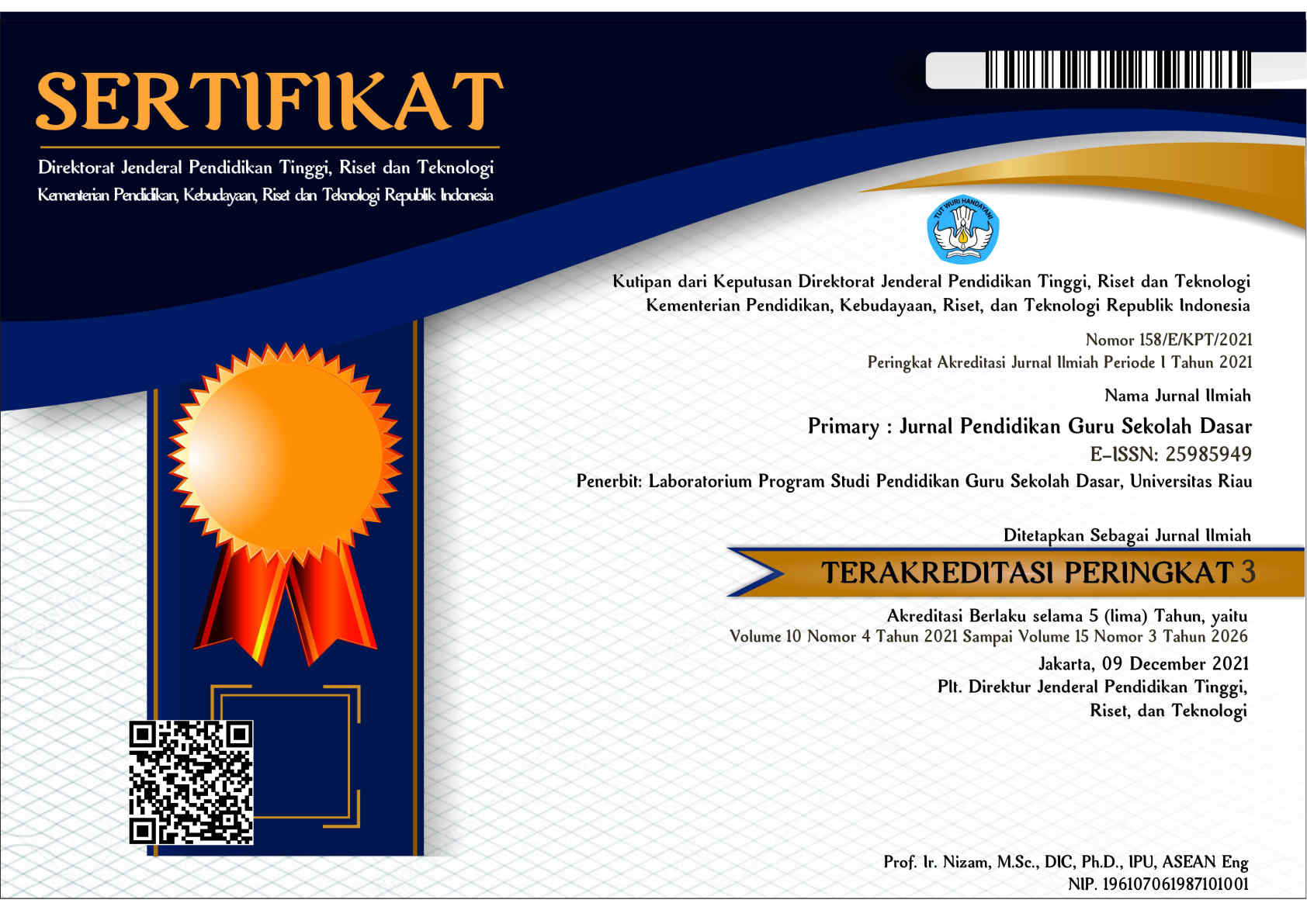PENERAPAN MODEL PEMBELAJARAN PROJECT BASED LEARNING TERHADAP KEMAMPUAN BERPIKIR KREATIF PADA MATERI SIKLUS AIR (HIDROLOGI) UNTUK SISWA KELAS V SEKOLAH DASAR
Abstract
This study aimed to analyze to what extend project based learning model improved the students’ creative thinking skills in the water cycle material at grade V SDN Sukanagara. The method of this study was a quasi-experimental method, with Nonequivalent Control Group Design. Samples in this study were 30 students in class VA as the experimental class and 30 students in class VB as the control class. The results showed that there were differences in the ability to think creatively based on the assessment data of the essay test between students who learned through Project Based Learning model and students who learned through direct learning model. This was evidenced from the results of the normality test, homogeneity and t-test, namely the sig value = 0.002 with dk = n1 -1 or dk = 30 - 1 = 29, α = 0.05 meaning that 0.002 <0.05. Then, H0 was rejected, Ha was accepted. There were differences in the ability to think creatively based on product assessment data between students who learned through Project Based Learning model and students who learned through direct learning model. This was evidenced from the results of the normality test, homogeneity and t-test, namely the sig value = 0.046 with dk = n1 -1 or dk = 30 - 1 = 29, α = 0.05 meaning that 0.046 <0.05. Then, H0 was rejected, Ha was accepted.
Keywords
Full Text:
PDF (Bahasa Indonesia)References
Aguspinal. (2011). Peningkatan Kemampuan Berpikir Kreatif dan Komunikasi Matematis Siswa Melalui Pendekatan Open-Ended Dengan Strategi Group- to-Group. Tesis. Bandung: UPI.
Ahiri, J. (2008). Metodologi Penelitian. Kendari: Unhalu Press.
Arikunto, S. (2012). Prosedur Penelitian Suatu Pendekatan Praktik. Jakarta: Rineka Cipta.
Kementerian Pendidikan dan Kebudayaan. (2014). Modul Implementasi Kurikulum 2013. Jakarta: Kemendikbud.
Kosasih. (2012). Meningkatkan Berpikir Kreatif Dan Komunikasi Matematis Siswa Melalui Pendekatan Open-Ended. Universitas Pendidikan Indonesia Diakses 25 Desember 2019.
Purwanto. (2011). Evaluasi Hasil Belajar. Yogyakarta: Pustaka Pelajar.
Sudjana, Nana. (2009). Penilaian Hasil Proses Belajar Mengajar. Bandung: PT. Remaja Rosdakarya.
Sugiyono. (2013). Metodologi Penelitian Pendidikan. Bandung: Alfabeta.
Sugiyono. (2018). Metodologi Penelitian Pendidikan. Bandung: Alfabeta.
Wena, M. (2014). Strategi pembelajaran inovatif kontemporer (suatu tinjauan konseptual operasional). PT Bumi Aksara.
DOI: http://dx.doi.org/10.33578/jpfkip.v10i4.8054
Refbacks
- There are currently no refbacks.
Copyright (c) 2021 Feggy Nazua

This work is licensed under a Creative Commons Attribution-NonCommercial-ShareAlike 4.0 International License.
____________________________________________________________
Primary: Jurnal Pendidikan Guru Sekolah Dasar
Secretariat
Program Studi Pendidikan Guru Sekolah Dasar
Gedung B1, FKIP Universitas Riau
Kampus Bina Widya Km. 12,5 Simpang Baru Panam
Pekanbaru Riau Indonesia 28293
e-mail : primary@ejournal.unri.ac.id



